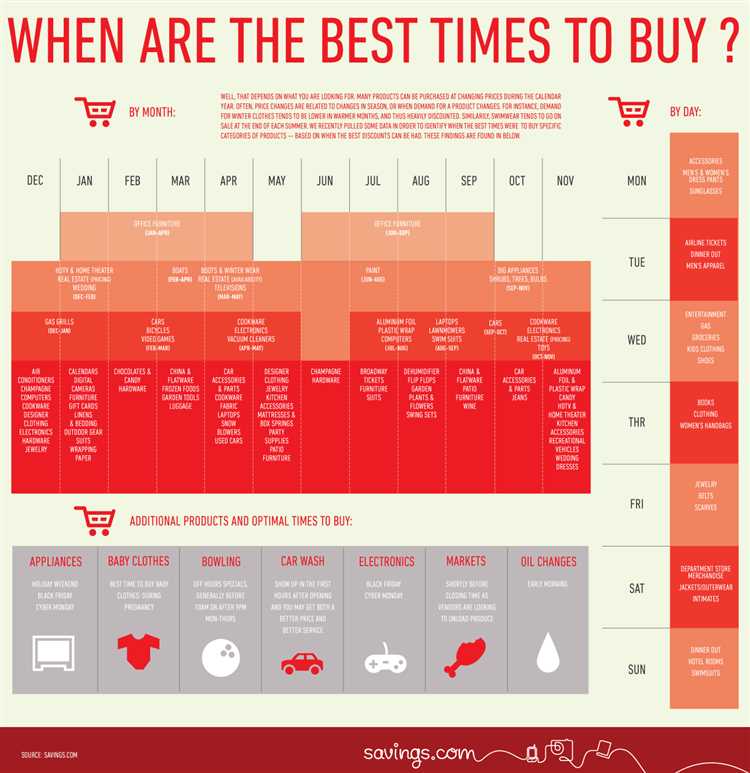Content:
- When is the best time to buy a car?
- Factors to consider when buying a car
- A comprehensive guide to buying a car
- Understanding the car-buying process
Buying a car is a major financial decision that requires careful planning and consideration. One important factor to consider is the timing of your purchase. The timing can greatly affect the price you pay and the options available to you. In this comprehensive guide, we will explore the best time to buy a car and provide you with valuable insights to help you make an informed decision.
One of the best times to buy a car is at the end of the month or the end of the year. Many car dealerships have monthly and yearly sales targets that they need to meet, and they may be more willing to negotiate and offer incentives during these periods. So, if you can wait until the end of the month or year, you may be able to get a better deal on your car.
Another opportune time to buy a car is when the new models are about to arrive. Car dealerships often need to make space for the new inventory, which means they may be more willing to offer discounts and special promotions on the current models. Keep an eye out for announcements about new model releases, and plan your purchase accordingly.
Timing your purchase to coincide with holidays or special events can also work in your favor. Many car dealerships offer special discounts and incentives during holidays like Memorial Day, Labor Day, and Black Friday. These sales events can be a great opportunity to save money on your car purchase. Additionally, car manufacturers sometimes offer special financing options or cashback deals during these periods, making it even more advantageous to buy a car during these times.
In conclusion, the best time to buy a car can vary depending on various factors such as the end of the month or year, the release of new models, or holidays and special events. By being strategic and timing your purchase accordingly, you can potentially save money and get the best deal on your car. Remember to do your research, compare prices, and negotiate with dealerships to ensure you make the most informed decision and get the car you want at a price that suits your budget.
When is the best time to buy a car?
Buying a car is a major financial decision, and finding the right time to make the purchase can save you a significant amount of money. While there is no one-size-fits-all answer to this question, there are certain periods and factors to consider that can help you make an informed decision.
End of the year

One of the best times to buy a car is at the end of the year. As dealerships are trying to meet their annual sales goals, they may offer attractive discounts and incentives to encourage customers to make a purchase. Additionally, the next year’s models are often released around this time, which means the current year’s models may be discounted to make room for the new inventory.
Holiday weekends

Holiday weekends, such as Memorial Day, Labor Day, and Presidents’ Day, are also popular times for car sales. Dealerships often run promotions and special offers during these periods to attract customers. It’s worth keeping an eye out for these holiday sales, as you may be able to negotiate a better deal or find exclusive discounts.
End of the month or quarter
Another strategic time to buy a car is at the end of the month or quarter. Salespeople and dealerships often have monthly or quarterly sales targets to meet, and they may be more willing to negotiate and offer discounts in order to reach their goals. Take advantage of this opportunity to secure a better deal on your car purchase.
Off-peak seasons
During off-peak seasons, such as winter, you may find better deals on cars. Demand tends to be lower during these times, which means dealerships may be more willing to negotiate on prices. Additionally, the end of the year is often considered an off-peak season for car sales, as people are focused on holiday expenses. Take advantage of this slower period to find a great deal on your desired vehicle.
Ultimately, the best time to buy a car will depend on your personal circumstances and preferences. However, considering these factors and timing your purchase strategically can help you save money and get the best possible deal on your new car.
Factors to consider when buying a car

When it comes to buying a car, there are several factors that you should consider before making a decision. These factors can help you determine the best car for your needs and ensure that you make a wise investment.
Budget
One of the most important factors to consider when buying a car is your budget. You should determine how much you are willing to spend on a car and stick to that budget. This will help you narrow down your options and prevent you from overspending. Additionally, you should also consider the costs of maintenance, insurance, and fuel consumption when determining your budget.
Car type
Another factor to consider is the type of car that suits your needs. Are you looking for a compact car for city driving, or do you need a larger SUV for family trips? Consider your lifestyle, daily commute, and specific requirements to determine the best type of car for you.
Reliability and safety
Reliability and safety should also be key considerations when buying a car. Look for a car brand and model with a good reputation for reliability, as this will help ensure that you have a car that will last and require minimal repairs. In terms of safety, check for features such as airbags, anti-lock brakes, stability control, and crash test ratings.
Resale value
Resale value is another important factor to consider when buying a car. Some car brands and models retain their value better than others, which can be beneficial if you plan to sell or trade in your car in the future. Do some research on the resale value of different cars to make an informed decision.
Research and test drive
Before making a final decision, it’s important to do thorough research and test drive the car you are considering. Read reviews, compare different options, and visit dealerships to gather as much information as possible. Test driving the car will give you a firsthand experience of how it feels and performs on the road. This will help you make a more informed decision about which car is the best fit for you.
A Comprehensive Guide to Buying a Car
Buying a car is a significant financial and personal decision that requires careful consideration. This comprehensive guide aims to provide you with the necessary information and tips to make an informed choice when purchasing a car.
1. Determine Your Needs
Before starting your car search, it is important to assess your needs and priorities. Consider factors such as the number of passengers, cargo space, fuel efficiency, and safety features. This will help narrow down your options and ensure that the car you choose meets your specific requirements.
2. Do Your Research
Take the time to research different car models and brands. Read reviews, compare prices, and examine the overall reliability and performance of the vehicles you are interested in. This will give you a better understanding of what to expect and help you make an informed decision.
3. Set a Budget
Before stepping foot into a dealership, it is essential to set a budget for your car purchase. Consider not only the upfront cost but also factors such as insurance, maintenance, and fuel expenses. This will help you determine how much you can afford to spend and prevent you from overspending.
4. Test Drive and Inspect
Once you have narrowed down your options, schedule test drives to get a feel for how the car performs on the road. Pay attention to the comfort, handling, and overall driving experience. Additionally, thoroughly inspect the vehicle for any signs of damage or mechanical issues.
5. Negotiate and Compare
When it comes to buying a car, negotiation is key. Research the market value of the car you are interested in and be prepared to negotiate the price with the dealer. Additionally, compare prices from different dealerships to ensure you are getting the best deal possible.
By following these steps and taking your time, you can ensure that you make a well-informed decision when buying a car. Remember to consider your needs, do thorough research, set a budget, test drive and inspect, and negotiate and compare prices. Happy car shopping!
Understanding the car-buying process
Buying a car can be an exciting and important decision, but it’s essential to understand the car-buying process to make the best choices. This guide aims to help you navigate the steps involved in purchasing a vehicle.
Research: The first step in the car-buying process is to research your options. Take the time to identify your needs and preferences, such as the type of car, features, and budget. Utilize online resources, car reviews, and consumer reports to gather information and compare different models and prices.
Budget: Setting a budget is crucial during the car-buying process. Consider your financial situation, including your income, expenses, and ongoing costs like insurance and maintenance. Determine how much you can afford to spend on a car and stick to it.
Financing: Once you have a budget in mind, it’s time to explore your financing options. Research different lenders, such as banks or credit unions, to find the best interest rates and loan terms. Pre-approval for a loan can give you more negotiating power when visiting dealerships.
Test Drive: Before making a final decision, it’s essential to test drive the car you’re interested in. This will allow you to experience the vehicle’s performance, comfort, and features firsthand. Pay attention to how it handles on different road conditions and listen for any unusual noises.
Negotiation: When you’re ready to make a purchase, it’s time to negotiate the price. Do your research on the car’s market value, and be prepared to negotiate with the dealer. Consider factors such as the condition of the car, mileage, and any additional features or warranties.
Documentation: Once you’ve agreed on a price, it’s important to review and understand all the paperwork involved in the car-buying process. This includes the purchase agreement, financing documents, and any warranties or service contracts. Take the time to read through everything carefully and ask questions if anything is unclear.
Conclusion: Understanding the car-buying process is essential to ensure a smooth and successful purchase. By researching, setting a budget, exploring financing options, test driving, negotiating, and reviewing documentation, you can make an informed decision and find the right car for your needs.
